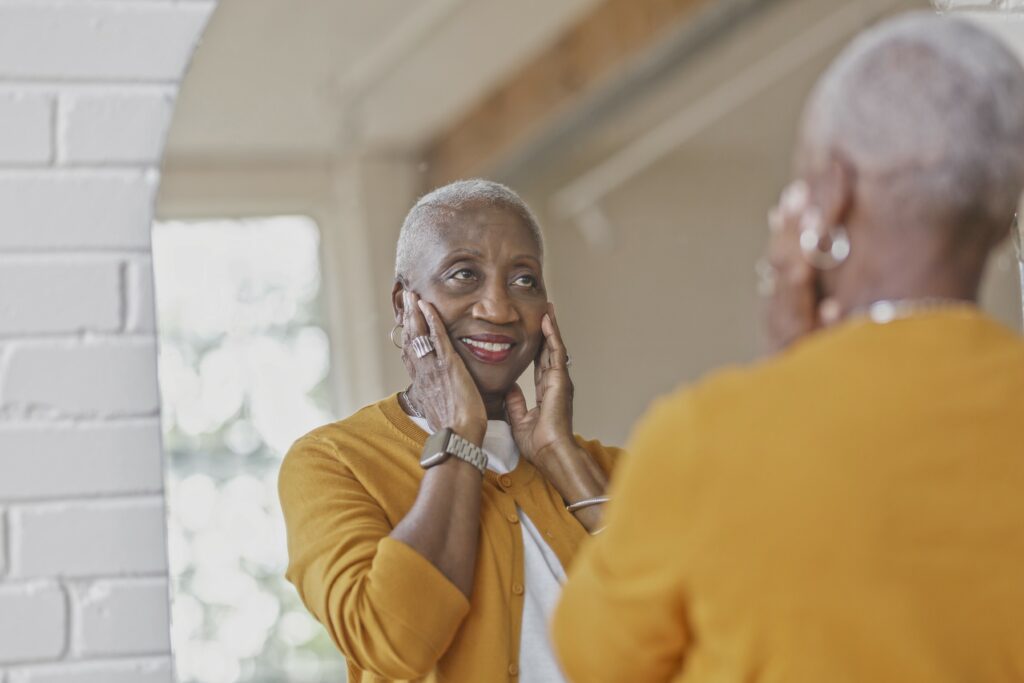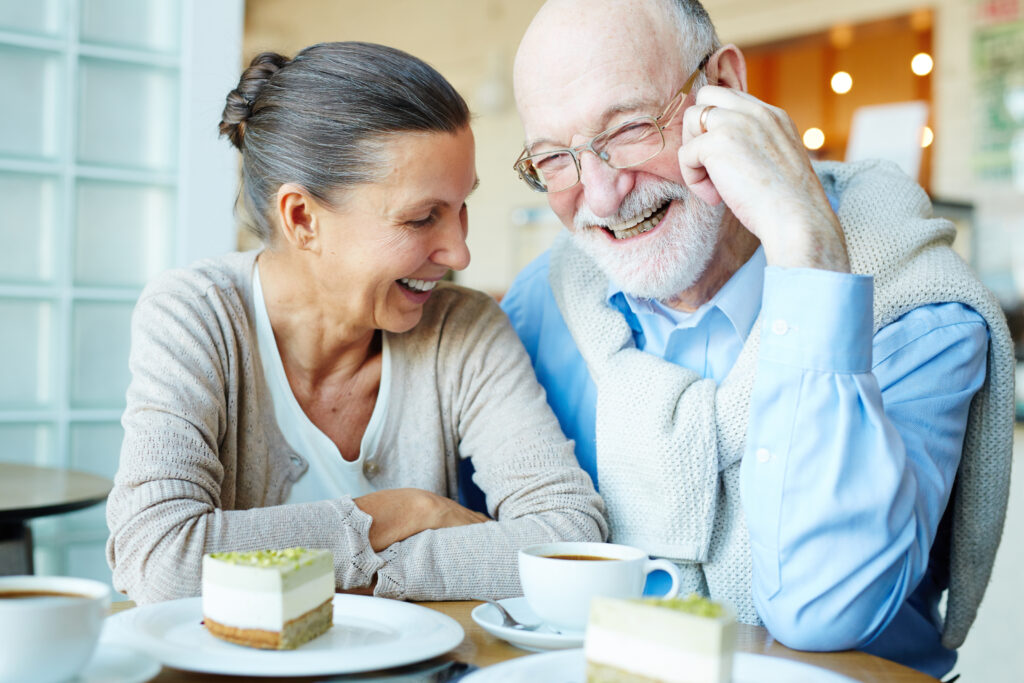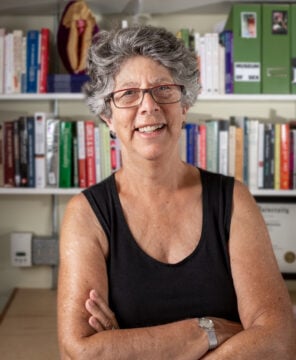How you relate to your aging body can have an enormous impact on your sexual life. Researchers have found that women who feel frumpy report a decline in their sexual desire. When men have difficulties with erections, they avoid sex. Feeling badly about your body can affect your self-esteem. My own research on LGBTQ+ older adults showed a connection between internalized homophobia and relationship satisfaction, a predictor for sexual satisfaction.
How the world relates to aging bodies can also have an impact on older adults’ sexuality. When we hear people say older adults “can’t get it up” or “they’re all washed up” or “age before beauty,” the comments are purely negative. And if those characterizations are extended to older adults’ sexuality, the possibilities narrow to either asexuality or hypersexuality. Yet the reality is there are many other possibilities.
Trying to reverse aging is almost impossible. And as we age, we see new challenges in our sexual lives as well. But reversing ageist notions? Now that’s a real possibility. Let’s try an experiment. While the rest of the world may see our bodies in a negative way, we can counteract those notions by substituting the word “beautiful” for the word “old.” For instance: Next time you look in the mirror, instead of focusing on your wrinkles, try telling yourself, “My wrinkles look beautiful.”

As an older woman with an aging body, I know some of these issues firsthand. The ways my body doesn’t always respond the way it used to. The ways my skin doesn’t look the way it used to. The ways my body parts have dropped or drooped or gotten lower or wider. The ways my body can sometimes surprise me. Every morning, I wake up and scan my body for what hurts or what’s aching. And if it’s that ache in my hip, I tell myself, “I love my right hip.” Try this yourself. Just send some love to those body parts that hurt and see what happens in your mind. It may not cure arthritis but it can change the way you feel about your body and that’s worth much much more.
As I’ve aged, I’ve noticed that along with my aches and sags and pains, I have more patience. I’m more curious. I’m able to linger in my excitement longer. My skin is softer. I understand my partner better. I’m more forgiving of mistakes in others and myself. I no longer have to strive to fit a certain ideal. I’m creating the ideal myself.
Try another experiment. Take a look at your body and feel it with your hands, all over. You don’t have to remove your clothes. What do you see? What do you feel? How do you relate to your older body? What changes have you noticed? How does it feel to touch different parts? Does anything surprise you? Any parts feel more or less sexually charged than when you were younger? Do you feel fatter? Skinnier? Muscle tone changed? How would you like to improve the way you feel about your body in the future? Now thank your body for all you’ve put it through during your lifetime. All the physical and emotional changes. Offer your body some gratitude.
How we feel about our bodies and how much we may be critical of our bodies probably started a long time ago. And it affects us today. Sex – however you define it — feels different to each of us. When we were younger, we may have loved a certain kind of touch. But as we age, our bodies may respond differently. Some may hate the very kind of stimulation that they loved when they were younger. When you explore what feels good, what doesn’t feel like anything, and what feels uncomfortable, you’re getting to know your body’s sensations as you age.
I want to reinforce for all of us who have ever felt too fat, too short, too dark, too light, too curly, too straight, too tall, too small breasted, too big bottomed, too small, too big a belly, too anything, your body is beautiful. As an older person — any gender or identity or orientation — each older person faces the negative stereotypes of aging bodies and how we look at ourselves can alter our mind’s landscape.
Some of these notions are based on our physical health. Yet many of these are pure ageism. And since many of us were brought up in the 50s and 60s, people wanted us to believe that having sex with anyone outside of marriage is a complete no-no. Or that having sex without the goal of procreation is a complete no-no. Or that having sex with yourself — masturbation — was such a no-no that you supposedly grew hair on your palms or went blind from it.
These notions are outmoded and not particularly helpful to sexual wellbeing. How do we continue to challenge the ageism that says we can’t love our bodies? We start with what we know and we find ways to love our own bodies even in the face of such pervasive images.
Even if we are beyond the age where we could procreate, there are still ways we can have sex for pleasure. And there are some pretty impressive health benefits of sexual expression as we age. Regular sexual expression can prevent heart disease and complications from heart disease, reduce risks of breast cancer and prostate cancer, improve sleep, reduce tension, reduce anxiety and depression, and improve your overall quality of life.

For an aging body, having sex can mean you are taking care of your physical and mental health as well as challenging stigmas. Yet how we feel about our sexual selves may be challenging based on past traumas, shame, expectations, what we were taught by our families, our religious backgrounds, or what our worldviews are. We may also have internalized how others view our gender, sexual identity, sexual orientation, racial or ethnic backgrounds, and certainly, our age.
As we age, through illness or surgeries, we may experience losses to the very parts of our bodies that brought us the most pleasure. My colleague, Sabitha Pillai-Friedman calls these ambiguous losses. Those body parts may no longer feel pleasure or exist on our bodies but that doesn’t mean we stop feeling pleasure in other ways. It’s about relearning our bodies.
Whatever it is that gets in the way, we can all increase our capacity to love our bodies as we age, even as they may disappoint or fail us, to find sexual pleasure at any age. Be grateful for those years you’ve spent until this time, the good work you’ve done, the lives you’ve touched, the struggles you’ve been through. Now is your time to enjoy the pleasures you deserve.
References
Dewitte, M., Bettocchi, C., Carvalho, J., Corona, G., Flink, I., Limoncin, E., Pascoal, P., Reisman, Y. & Van Lankveld, J. (2021). A psychosocial approach to erectile dysfunction: position statements from the European Society of Sexual Medicine (ESSM). Sexual Medicine, 9(6), 100434. https://doi.org/10.1016/j.esxm.2021.100434
Ebrahim, S., May, M., Shlomo, Y. B., McCarron, P., Frankel, S., Yarnell, J., & Smith, G. D. (2002). Sexual intercourse and risk of ischaemic stroke and coronary heart disease: the Caerphilly study. Journal of Epidemiology & Community Health, 56(2), 99-102. https://jech.bmj.com/content/56/2/99.full
Fleishman, J. (2020). Let’s get physical: From sexual dysfunction to sexual wellness. AgeRight Blog. https://ageright.org/2020/02/14/sexual-wellness/
Fleishman, J. M., Crane, B., Koch, P. B. (2019). Correlates and predictors of sexual satisfaction for older adults in same-sex relationships. Journal of Homosexuality. 1-25. https://doi.org/10.1080/00918369.2019.1618647
Harris, M. A., & Orth, U. (2020). The link between self-esteem and social relationships: A meta-analysis of longitudinal studies. Journal of personality and social psychology, 119(6), 1459-1477. http://dx.doi.org/10.1037/pspp0000265
Koch, P. B., Mansfield, P. K., Thurau, D., & Carey, M. (2005). “Feeling frumpy”: The relationships between body image and sexual response changes in midlife women. Journal of Sex Research, 42(3), 215-223. https://doi.org/10.1080/00224490509552276
Leitzmann, M. F., Platz, E. A., Stampfer, M. J., Willett, W. C., & Giovannucci, E. (2004). Ejaculation frequency and subsequent risk of prostate cancer. JAMA, 291(13), 1578-1586. https://jamanetwork.com/journals/jama/fullarticle/198487
Pillai-Friedman, S., & Ashline, J. L. (2014). Women, breast cancer survivorship, sexual losses, and disenfranchised grief–a treatment model for clinicians. Sexual and Relationship Therapy, 29(4), 436-453. https://doi.org/10.1080/14681994.2014.934340
Syme, M. L., Cohn, T. J., Stoffregen, S., Kaempfe, H., & Schippers, D. (2019). “At my age…”: defining sexual wellness in mid-and later life. The Journal of Sex Research, 56(7), 832-842. https://doi.org/10.1080/00224499.2018.1456510


 Dr. Jane Fleishman
Dr. Jane Fleishman